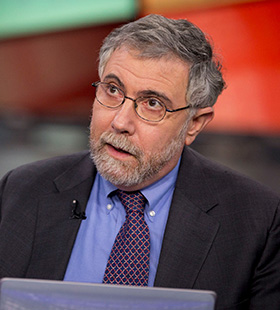- Paul Krugman, Nobel Prize Economist
Paul Krugman is an American economist and journalist who received the 2008 Nobel Prize for Economics for his work in economic geography and in identifying international trade patterns. He was also known for his op-ed column in The New York Times. Krugman was awarded a B.A. from Yale University in 1974 and a Ph.D. from MIT in 1977. He served as a member of MIT’s economics faculty from 1979 to 2000, leaving for a year (1982–83) to work as the chief staffer for international economics on U.S. Pres. Ronald Reagan’s Council of Economic Advisers and again for a hiatus (1994–96) to teach at Stanford University. From 1979 he also worked as a research associate at the National Bureau of Economic Research. In 2000 he became a professor of economics and international affairs at the Woodrow Wilson School of Public and International Affairs at Princeton University; he retired in 2015 as professor emeritus. He subsequently became a professor at the City University of New York’s Graduate Center. A prolific writer, Krugman published more than 20 books and 200 papers in professional journals. Among his writings were regular magazine columns in Slate (1996–99) and Fortune (1997–99), and from 1999 he was an op-ed columnist for The New York Times. His books included the essay collection The Great Unraveling: Losing Our Way in the New Century (2003), which criticized the administration of Pres. George W. Bush; economics textbooks such as Microeconomics (2004) and Macroeconomics (2005); and nonacademic works such as The Return of Depression Economics (1999), The Conscience of a Liberal (2007), and Arguing with Zombies: Economics, Politics, and the Fight for a Better Future (2020). In addition to the Nobel Prize, Krugman received many honours, including the 1991 John Bates Clark medal, awarded to economists under age 40.
Featured:
The Future of Money

